PORT ANGELES — Recreational angling advocate Dave Croonquist of Sequim is waiting to discover if he has received an appointment by Gov. Jay Inslee to one of three at-large seats on the nine-member Washington Wildlife Commission.
Croonquist seeks to join the group, whose primary role is to establish policy and direction for fish and wildlife species and their habitats in the state and to monitor the Fish and Wildlife Department’s implementation of goals, policies and objectives established by the commission.
The commission also classifies wildlife and establishes the basic rules and regulations governing the time, place, manner and methods used to harvest or enjoy fish and wildlife.
Croonquist counts support from a variety of private citizens and the Port of Port Angeles, which unanimously voted Feb. 27 to have Port Executive Director Karen Goschen submit a letter of support of his bid for appointment.
“He’s been a great voice for us and I would like to see his voice on the board,” said Connie Beauvais, president of the board of the Port of Port Angeles board of commissioners.
Fellow commissioner Colleen McAleer agreed.
“If he could get on this board it would be a real win for Clallam County,” McAleer said.
Croonquist is counting on a three-decade career in wildlife law enforcement with the Colorado Division of Wildlife and nearly two decades of recreational angling advocacy here in Washington.
“I hope I can bring 49-plus years of fish and wildlife management experience to the commission,” Croonquist said Tuesday.
Croonquist earned a fisheries management degree from the University of Washington and soon joined the Colorado Division of Wildlife as a Wildlife Conservation Officer, rising through the ranks of the division through the next three decades, retiring as assistant chief of law enforcement.
He was particularly proud of the Colorado legislature’s passage of Samson’s Law in 1998, which significantly stiffened penalties for poachers.
Samson was a 1,000-pound bull elk beloved by residents of Estes Park, Colo. — and a frequent visitor to the grounds of the YMCA of the Rockies. The elk was poached on YMCA grounds by an arrow shot from a nearby cabin by Randall Francis, who was shooting trophy-quality animals, removing their heads and selling for profit.
“The poacher was quickly apprehended but the penalties in place were not sufficient,” Croonquist said. “The bill significantly enhanced penalties for taking trophy-class wildlife.”
And Croonquist was pleased to trim Colorado’s wildlife statutes from 120 pages to 75.
“We worked on a total re-write of the Colorado statutes, really cleaned things up and made it easier for the public to understand,” Croonquist said.
“The big change that field officers liked best — violations became a straight cash fine. That cut back on the case load for the courts and for field officers. They could instead write a penalty assessment for the violater.”
Croonquist retired in 2000 and has devoted much of his time to fishing issues as a member of Puget Sound Anglers and the Coastal Conservation Association. He’s served as volunteer coordinator for the Dungeness Hatchery Complex, on Fish and Wildlife’s Steelhead/Cutthroat Policy Advisory Group, Enforcement Advisory Group (now the Shared Values Group), Puget Sound Recreational Fisheries Enhancement Oversight Committee, and the Puget Sound Sport Fish Advisors Group.
He’s also a member of the Prey Work Group for the Governor’s Orca Task Force.
“I’ve sat in on enough commission meetings here and I would like to think I can bring a different mindset or a different line of questioning with staff in getting changes made,” Croonquist said.
Croonquist said the commission will provide guidance on a number of crucial issues going forward.
“We have a lot of areas of concern right now,” Croonquist said. “Southern resident killer whales, review of hatchery operations and whether the commission is going down right path on salmon recovery, and there’s interest in terrestrial management issues. Wolves are a topic of discussion in commission meetings and that area is interesting.”
He’d like the commission to look at how fishing/hunting violations are handled.
“Taking a look at what can we do to make handling violations easier for the field and to limit the impact on the court system,” Croonquist said.
“We have civil forfeiture violations now, but most have to be filed though the prosecutor’s office in each county and go through the court system. Some counties are good about making sure these cases come to a resolution, but there are cases having to wait for years, if they even get processed to get through the system.
“Wildlife crime is important to those of us who hunt and fish, we want to make sure bad guys aren’t abusing their privileges. But a lot of tickets are handled as summons to court, and that is a burden on field officers, or you might have a county or deputy prosecutor who doesn’t know about hunting or fishing. Those delays are not fair to the resource, agency or violator.”
Croonquist also has experience representing individual sport fishers, city and county agencies, Puget Sound Anglers and the Coastal Conservation Association at commission meetings, North of Falcon, Pacific Fisheries Management Council and International Pacific Halibut Commission meetings working toward more fishing opportunities and questioning the methodologies used to arrive at catch and angler pressure estimates.
He’d like to see more opportunities for public input in the regulation process.
“Opportunity for public input, you have one shot at it and maybe that needs to be a three-step process,” Croonquist said.
Commission members also serve on one or two sub-committees.
“I’d be interested on the fish committee, that’s where my true passion is, recreational fishing opportunities,” Croonquist said. “I was at the Fish Committee meeting on Feb. 7, [Commission chair Larry Carpenter made the comment that the new commissioner, whoever they might be, might end up on that [wolves] subcommittee.”
Croonquist said he’s heard the Governor’s Office Boards expects to hear the news by phone sometime this week.
Peninsula Daily News reporter Paul Gottlieb contributed to this report.

